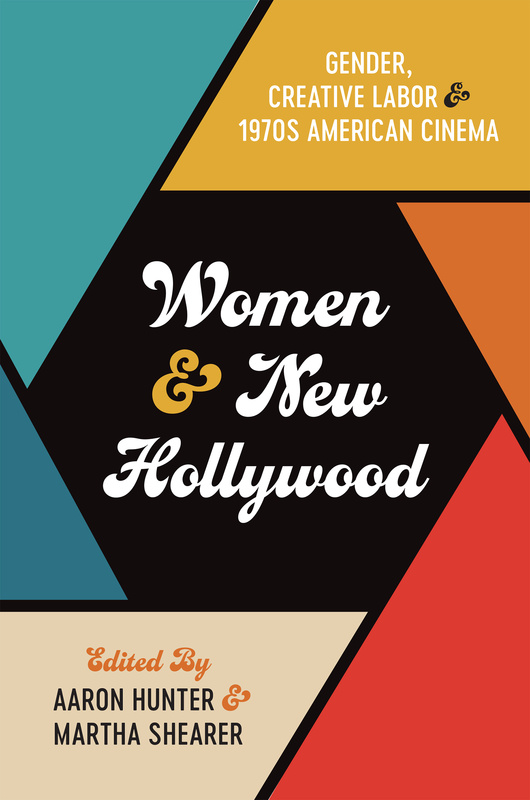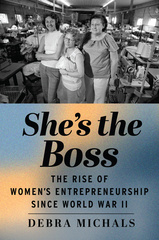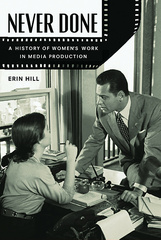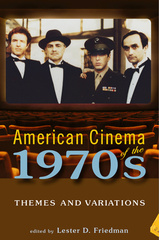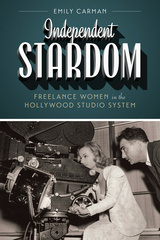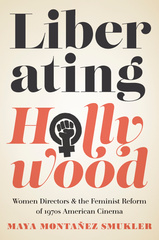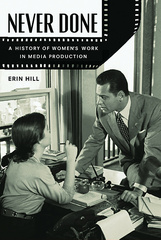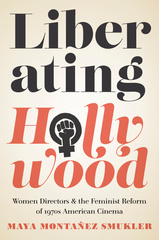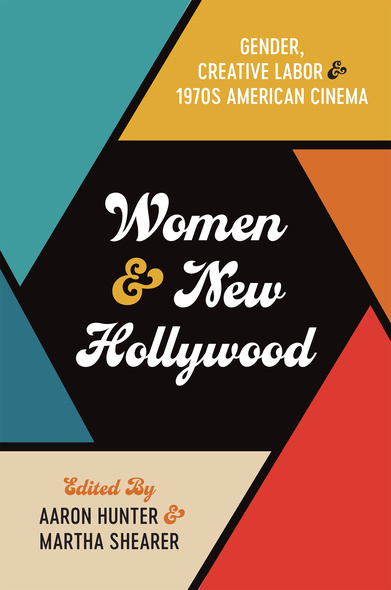
260 pages, 6 1/8 x 9 1/4
4 bw, 11 color images
Paperback
Release Date:12 May 2023
ISBN:9781978821798
Hardcover
Release Date:12 May 2023
ISBN:9781978821804
Women and New Hollywood
Gender, Creative Labor, and 1970s American Cinema
Edited by Aaron Hunter and Martha Shearer
Rutgers University Press
The 1970s has often been hailed as a great moment for American film, as a generation of “New Hollywood” directors like Scorsese, Coppola, and Altman offered idiosyncratic visions of what movies could be. Yet the auteurist discourse hailing these directors as the sole authors of their films has obscured the important creative roles women played in the 1970s American film industry.
Women and New Hollywood revises our understanding of this important era in American film by examining the contributions that women made not only as directors, but also as screenwriters, editors, actors, producers, and critics. Including essays on film history, film texts, and the decade’s film theory and criticism, this collection showcases the rich and varied cinematic products of women’s creative labor, as well as the considerable barriers they faced. It considers both women working within and beyond the Hollywood film industry, reconceptualizing New Hollywood by bringing it into dialogue with other American cinemas of the 1970s. By valuing the many forms of creative labor involved in film production, this collection offers exciting alternatives to the auteurist model and new ways of appreciating the themes and aesthetics of 1970s American film.
Women and New Hollywood revises our understanding of this important era in American film by examining the contributions that women made not only as directors, but also as screenwriters, editors, actors, producers, and critics. Including essays on film history, film texts, and the decade’s film theory and criticism, this collection showcases the rich and varied cinematic products of women’s creative labor, as well as the considerable barriers they faced. It considers both women working within and beyond the Hollywood film industry, reconceptualizing New Hollywood by bringing it into dialogue with other American cinemas of the 1970s. By valuing the many forms of creative labor involved in film production, this collection offers exciting alternatives to the auteurist model and new ways of appreciating the themes and aesthetics of 1970s American film.
Women and New Hollywood provides the much-needed and long-awaited intervention on 1970s American movie industry mythologies, paying tribute to those whose talents, contributions, and perseverance were until now un(der)appreciated and, in so doing, modeling feminist media historiography at its finest.
A major disruption of conventional narratives about New Hollywood in the 1970s, this collection demonstrates how essential women were to all levels of filmmaking and film culture during a period of fundamental transformation and transition.
This ambitious and impressive edited collection, with contributions from some of the field’s most exciting scholars, is a much-needed feminist intervention into scholarship around the so-called 1970s Hollywood Renaissance. The essays place the women creators and collaborators—and vitally, their labor—back to the center of discussion where they belong. A stimulating and provocative read.
AARON HUNTER lectures in the Department of Film at Trinity College, Dublin. He is the author of Authoring Hal Ashby: The Myth of the New Hollywood Auteur and Polly Platt: Hollywood Production Design and Creative Authorship.
MARTHA SHEARER is an assistant professor and Ad Astra Fellow in Film Studies at University College Dublin. She is the author of New York City and the Hollywood Musical: Dancing in the Streets and coeditor of Musicals at the Margins: Genre, Boundaries, Canons.
MARTHA SHEARER is an assistant professor and Ad Astra Fellow in Film Studies at University College Dublin. She is the author of New York City and the Hollywood Musical: Dancing in the Streets and coeditor of Musicals at the Margins: Genre, Boundaries, Canons.
Introduction
AARON HUNTER AND MARTHA SHEARER
Part I History
1 The Rothman Renaissance, or the Politics of Archival (Re)Discovery
ALICIA KOZMA
2 Watering the Grapevine: Jessie Maple, Self-Narration, and the Trajectory of a Career in Community
NICHOLAS FORSTER
3 “It Was a Little Late in the Day for All That Prissy Business”: The New Hollywood Career of Jay Presson Allen
OLIVER GRUNER
4 “We Knew and She Knew That She Was Barbra”: Streisand in the 1970s
NICHOLAS GODFREY
5 I Know Why: Maya Angelou and the Promise of 1970s Hollywood
MAYA MONTAÑEZ SMUKLER
Part II Text
6 Women Editors in New Hollywood: Cutting Down on the Raging Bullshit
KAREN PEARLMAN
7 Elaine May’s Awkward Age
JAMES MORRISON
8 “She’s a Professional, Now”: Girlfriends, Creative Labor, and the Challenge of Feminist Professionalization
ABIGAIL CHEEVER
9 A Different Image: Studies in Contrasts by Women Filmmakers of the L.A. Rebellion
VIRGINIA BONNER
10 Barbara Loden’s Wanda (1970): A Radically Negative Feminist Aesthetic
ANNA BACKMAN ROGERS
Part III Theory and Criticism
11 Genealogies of a Decade: Classifying and Historicizing Women of the New Hollywood
AMELIE HASTIE
12 “Women’s-Movement Anger”: Pauline Kael and New Hollywood
ADRIAN GARVEY
13 Feminism, Auteurism, and the 1970s, in Theory
MARIA PRAMAGGIORE
Acknowledgments
Notes on Contributors
Index
AARON HUNTER AND MARTHA SHEARER
Part I History
1 The Rothman Renaissance, or the Politics of Archival (Re)Discovery
ALICIA KOZMA
2 Watering the Grapevine: Jessie Maple, Self-Narration, and the Trajectory of a Career in Community
NICHOLAS FORSTER
3 “It Was a Little Late in the Day for All That Prissy Business”: The New Hollywood Career of Jay Presson Allen
OLIVER GRUNER
4 “We Knew and She Knew That She Was Barbra”: Streisand in the 1970s
NICHOLAS GODFREY
5 I Know Why: Maya Angelou and the Promise of 1970s Hollywood
MAYA MONTAÑEZ SMUKLER
Part II Text
6 Women Editors in New Hollywood: Cutting Down on the Raging Bullshit
KAREN PEARLMAN
7 Elaine May’s Awkward Age
JAMES MORRISON
8 “She’s a Professional, Now”: Girlfriends, Creative Labor, and the Challenge of Feminist Professionalization
ABIGAIL CHEEVER
9 A Different Image: Studies in Contrasts by Women Filmmakers of the L.A. Rebellion
VIRGINIA BONNER
10 Barbara Loden’s Wanda (1970): A Radically Negative Feminist Aesthetic
ANNA BACKMAN ROGERS
Part III Theory and Criticism
11 Genealogies of a Decade: Classifying and Historicizing Women of the New Hollywood
AMELIE HASTIE
12 “Women’s-Movement Anger”: Pauline Kael and New Hollywood
ADRIAN GARVEY
13 Feminism, Auteurism, and the 1970s, in Theory
MARIA PRAMAGGIORE
Acknowledgments
Notes on Contributors
Index

